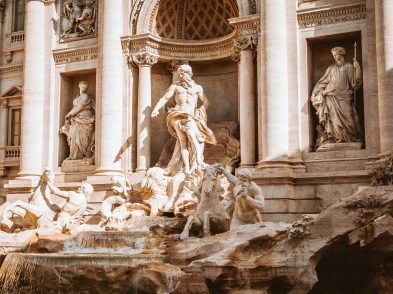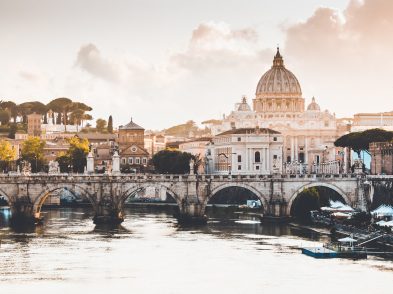With Italy being one of the most desirable locations in the EU for retirees, many are wondering how they can make this dream a reality. Many people from abroad aspire to live la dolce vita in a warm Mediterranean climate, immersing themselves in the art, culture and world-famous food.
When beginning this next chapter in your life, it is important to understand all the possible ways to pursue this dream successfully.

Here we outline the cost expectations, residency information and visa options for those interested in making the decision to retire in Italy.
Where in Italy? Location options and costs
Italy is divided into 20 regions, all offering something unique and different, from mountains to beaches, small villages to sprawling cities. Classic locations for retirees include Sicily, Puglia, Tuscany, Abruzzo, Lazio and Lombardy.
As well as selecting a location to live, there will also be the decision regarding whether to rent an apartment or purchase property. These choices depend on the individual’s personal preferences, lifestyle and investment interests. It is important to remember that the bigger, more tourist-centric areas like Rome, Florence and Tuscany tend to be more expensive in terms of property prices and cost of living.
Based on many expats’ experiences, couples who do not own property and are renting spend an average 600-800 euro a month on rent in a mid-sized city in Italy. Furthermore, if living in a big city like Milan, Rome, Bologna or Florence, it is likely to cost an additional €300-500 each month. Then there is the cost of utility bills, including water, gas, electricity and internet, which can amount to €150-200 each month. These may be higher during the winter. Finally, an individual might spend up to €300 per month on food, transport and recreational activities.
There is also the option to purchase property in Italy (for more information, see IREL), which is possible without having to be an Italian citizen, resident or even physically in the country through Italian legal representation. Of course, navigating the legal documents and bureaucracy can be very complicated, so using the services of an experienced attorney is crucial. Additionally, having an Italian tax code (codice fiscale) and Italian bank account are necessary to purchase property.
Remember that all documentation regarding the purchase of property will be written in Italian, which means that the assistance of a lawyer who is fluent in the legalese and processes related to these transactions is essential. Lastly, it is important to note that owning a house does not automatically entitle you to permanent residency in Italy. If you are not an Italian citizen and do not have a visa, you will only be able to stay in Italy for 90 days.
Why relocate to Italy? Pros and cons
Pros
Many people who relocate to Italy are drawn to the national healthcare system. Public healthcare is free for residents or costs a small fee, and includes preventive and primary care, tests, screenings and low-cost specialists.
Italy also offers a 7 per cent flat tax regime for foreign retirees who receive a pension from abroad. This tax incentive was designed to attract people to move back to Italy and repopulate specific municipalities and areas of the southern that experienced mass emigration. Therefore, this tax regime only applies if you move to eligible municipalities in Abruzzo, Calabria, Campania, Molise, Puglia, Sardinia and Sicily, where the number of inhabitants does not exceed 20,000 people. It is also important to note that, in order to qualify, individuals must not have resided in Italy five years prior to applying.
In addition to these benefits, many come to Italy because of its proximity to other European countries and the ease of travel between them, whether by train or reasonable airplane prices. If living in Italy on a visa, you are allowed to travel to other countries for up to 90 days, while still maintaining your residence in Italy and continuing to renew the visa, as long as you still comply with the requirements of the visa. However, it is important to note that spending large periods of time outside of Italy affect your visa renewal application.
Cons
While there may not be too many negatives connected to living your retirement years in the Bel Paese, some challenges may arise. First is the language barrier, as it cannot be assumed that all Italians speak English. However, living in a larger city will increase the likelihood of meeting more English-speaking expats, and establishing a community. The separation from friends and family can also be a difficult adjustment, and so connecting with other expats and integrating into the local community is important to feel settled in your new home.
How? Visa options
The Elective Residence Visa (also known as Retirement Visa, see this related podcast for more information) is a type of visa designed for individuals with high self-supporting incomes. Despite its name, the “retirement visa” is not intended exclusively for retirees, but for anyone looking to move to Italy who has a passive income. Therefore, the Elective Residence Visa cannot be used for extended tourism and, most importantly, this type of visa does not allow the applicant to work. It is also required that the applicant already has a registered lease or deed for a property in Italy, whether it be for a rental unit or a purchased property.
An application for an Elective Residence Visa cannot be filed in Italy. It must be started before your arrival. An important step in the process is make an appointment at the local Italian consulate that covers the jurisdiction where you reside. It is important to check the website for this consulate to determine if there are any specific requirements and be sure to book an appointment in advance as the entire process can take up to six months. There may be some variations in what the consulates require, but as a general rule the documents you will need to provide are:
- Official letters from banks or financial institutions that prove substantial and stable private income originating from pensions, properties or investment funds or from stable economic commercial activities
- Tax returns from the last two years
- A letter specifying your reasons for moving to Italy permanently
- A valid passport
- The visa application form which must be duly completed and signed (the application form can be found on the consulate’s website)
- A registered lease or deed for property in Italy
The minimum passive income required by law for one individual is €31,000 per year, which can come from investments, social security or a pension, but not work activities. Due to it being a strictly regulated visa, consular officers process applications thoroughly and it is important to show stable income streams that will continue over time. The visa is valid for 365 days, but it can be renewed every year, provided that you still meet the requirements at the time of renewal.
The Investor Visa (also known as the Golden Visa) was introduced in 2016 and allows non-EU citizens, but more specifically investors to stay in Italy for a two-year period, provided that they invest in strategic and specific areas of the Italian economy with the aim of contributing significantly to the country’s economic growth. The Italian Ministry of Economic Development has categorized the strategic areas and the minimum threshold of invested capital as follows:
- Investing in an Italian innovative start-up: € 250,000
- Investing in an Italian limited company: € 500,000
- Making a philanthropic donation: € 1 million
- Purchasing government bonds: € 2 million
The requirements to apply for this visa include proof that you have the funds and that you do not have criminal convictions or pending charges. You also need to provide a declaration of commitment with proof of consent from the recipient. The application for the visa can be submitted on the website of the Italian Ministry of Economic Development. The committee reviewing the application will have 30 days to assess your application and, if approved, you will have six months to request an Investor Visa at the Italian consulate that covers the jurisdiction where you reside. You will then be able to enter Italy within two years from the date of issue of the visa and request a residency permit. The visa is valid for two years and can be renewed for an additional three years.
Residency and citizenship
Once you arrive in Italy, you will need to visit the Questura (local police headquarters) within eight days of your arrival and apply for a residency permit (permesso di soggiorno). The Questura will verify that you meet the requirements and will reissue the residency permit each year. After living in Italy for five years, you are eligible to apply for permanent residency. After 10 years of legal residency, you can apply for Italian citizenship by residency.
It is also important to note that if you have Italian ancestry and you qualify for Italian citizenship by descent or if you are married to an Italian citizen, there are other pathways to obtain residency and citizenship.
If you are considering retiring in Italy and would like more information, please do not hesitate to contact ICA at info@italiancitizenshipassistance.com. You can also learn more about relocating to Italy and Italian citizenship by visiting italiancitizenshipassistance.com.







